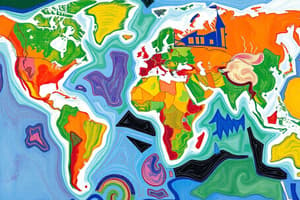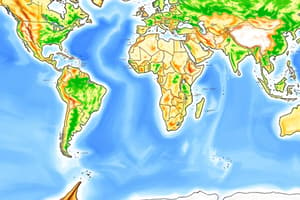Podcast
Questions and Answers
What does physical geography primarily examine?
What does physical geography primarily examine?
- Tools for data collection and analysis
- Demographics and economic systems
- Cultural landscapes and urban development
- Natural features such as landforms and climate (correct)
Which of the following is a sub-discipline of physical geography?
Which of the following is a sub-discipline of physical geography?
- Demographic analysis
- Cultural geography
- Urban planning
- Climatology (correct)
What is the definition of 'region' in geographical terms?
What is the definition of 'region' in geographical terms?
- The physical attributes of a location
- Areas defined by shared features (correct)
- The specific coordinates of a place
- The flow of people and goods
Which concept refers to the relationship between humans and their environment?
Which concept refers to the relationship between humans and their environment?
What role does Geographic Information Systems (GIS) play in geography?
What role does Geographic Information Systems (GIS) play in geography?
Which of the following is NOT considered a major concept in geography?
Which of the following is NOT considered a major concept in geography?
Which tool is primarily used for visual representation of spatial information?
Which tool is primarily used for visual representation of spatial information?
Which of the following describes remote sensing?
Which of the following describes remote sensing?
Flashcards are hidden until you start studying
Study Notes
Definition and Scope
- Geography is the study of the Earth's landscapes, environments, and the relationships between people and their environments.
- It encompasses both the physical characteristics of the Earth (physical geography) and the human societies that inhabit it (human geography).
Branches of Geography
-
Physical Geography
- Examines natural features such as landforms, climate, vegetation, and ecosystems.
- Sub-disciplines include geomorphology, climatology, biogeography, and hydrology.
-
Human Geography
- Focuses on the spatial aspects of human existence.
- Explores cultural landscapes, urban development, demographics, and economic systems.
-
Geographical Techniques
- Utilizes tools such as Geographic Information Systems (GIS), remote sensing, and cartography.
- Involves data collection and spatial analysis for better understanding of geographical phenomena.
Major Concepts
- Location: The specific coordinates or relative position of a place on Earth.
- Place: The characteristics that define a location, including physical and human attributes.
- Region: Areas that are defined by shared features, such as geography, culture, or politics.
- Movement: The flow of people, goods, and information across different locations.
- Human-Environment Interaction: The dynamic relationship between humans and their environment, involving adaptation and modification.
Importance of Geography
- Aids in understanding global issues such as climate change, urbanization, and resource management.
- Supports planning and development in various fields such as urban planning, environmental management, and disaster response.
- Enhances spatial awareness and critical thinking regarding world events and cultural differences.
Tools and Techniques
- Maps: Visual representations of areas used to convey spatial information.
- GIS: Technology for capturing, storing, analyzing, and managing spatial data.
- Remote Sensing: Collecting data about the Earth's surface via satellite or aerial imagery.
- Spatial Analysis: Techniques for examining the locations and patterns of phenomena in geography.
Key Concepts in Physical Geography
- Landforms: Types include mountains, valleys, plains, plateaus, and deserts.
- Climate Zones: Classification based on temperature and precipitation patterns (e.g., tropical, arid, temperate).
- Ecosystems: Interactions between living organisms and their physical environments.
Key Concepts in Human Geography
- Cultural Geography: The study of cultural practices, identities, and landscapes.
- Economic Geography: The distribution of economic activities and resources.
- Political Geography: Analysis of spatial aspects of politics, boundaries, and governance.
Global Issues in Geography
- Climate change and its impact on natural and human systems.
- Urbanization and its effects on society and the environment.
- Globalization and the interconnectedness of economies and cultures.
Definition and Scope
- Geography studies Earth's landscapes, environments, and human-environment relationships.
- It includes physical geography, which examines natural features, and human geography, which focuses on societies.
Branches of Geography
- Physical Geography: Analyzes landforms, climate, vegetation, and ecosystems; sub-disciplines are geomorphology, climatology, biogeography, and hydrology.
- Human Geography: Investigates spatial aspects of human life; covers cultural landscapes, urban development, demographics, and economic systems.
- Geographical Techniques: Employs tools like GIS, remote sensing, and cartography for data collection and spatial analysis.
Major Concepts
- Location: Refers to specific coordinates or relative positioning of places.
- Place: Describes unique characteristics of a location, both physical and human.
- Region: Defined areas based on common features like geography, culture, or politics.
- Movement: Describes the movement of people, goods, and information across locations.
- Human-Environment Interaction: Examines how humans adapt to and modify their environment.
Importance of Geography
- Essential for understanding global issues such as climate change and urbanization.
- Supports development in fields like urban and environmental management, as well as disaster response.
- Enhances spatial awareness and critical thinking about events and cultural differences.
Tools and Techniques
- Maps: Visual tools to convey spatial information about areas.
- GIS: A technology that captures, analyzes, and manages spatial data.
- Remote Sensing: Gathers data about Earth’s surface through satellite and aerial imagery.
- Spatial Analysis: Techniques for analyzing the locations and patterns of geographic phenomena.
Key Concepts in Physical Geography
- Landforms: Includes mountains, valleys, plains, plateaus, and deserts.
- Climate Zones: Classified by temperature and precipitation, such as tropical, arid, and temperate zones.
- Ecosystems: Study of interactions between living organisms and their physical surroundings.
Key Concepts in Human Geography
- Cultural Geography: Focuses on cultural practices, identities, and landscapes.
- Economic Geography: Examines distribution and location of economic activities and resources.
- Political Geography: Analyzes spatial dimensions of politics, including boundaries and governance.
Global Issues in Geography
- Climate change impacts both natural systems and human societies.
- Urbanization affects societal structures and environmental conditions.
- Globalization emphasizes the interconnections among economies and cultures.
Studying That Suits You
Use AI to generate personalized quizzes and flashcards to suit your learning preferences.




